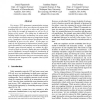Free Online Productivity Tools
i2Speak
i2Symbol
i2OCR
iTex2Img
iWeb2Print
iWeb2Shot
i2Type
iPdf2Split
iPdf2Merge
i2Bopomofo
i2Arabic
i2Style
i2Image
i2PDF
iLatex2Rtf
Sci2ools
ICNP
2005
IEEE
2005
IEEE
Incentives to Promote Availability in Peer-to-Peer Anonymity Systems
Peer-to-peer (P2P) anonymous communication systems are vulnerable to free-riders, peers that use the system while providing little or no service to others and whose presence limits the strength of anonymity as well as the efficiency of the system. Free-riding can be addressed by building explicit incentive mechanisms into system protocols to promote two distinct aspects of cooperation among peers—compliance with the protocol specification and the availability of peers to serve others. In this paper we study the use of payments to implement an incentive mechanism that attaches a real monetary cost to low availability. Through a game theoretic analysis, we evaluate the effectiveness of such an incentive, finding that peer availability
Anonymous Communication Systems | Explicit Incentive Mechanisms | ICNP 2005 | Incentive Mechanism | Network Protocols |
| Added | 25 Jun 2010 |
| Updated | 25 Jun 2010 |
| Type | Conference |
| Year | 2005 |
| Where | ICNP |
| Authors | Daniel R. Figueiredo, Jonathan K. Shapiro, Donald F. Towsley |
Comments (0)

